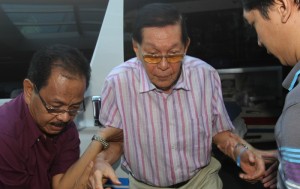No jail time for Sen. Juan Ponce Enrile—at least none for now.
The Sandiganbayan on Friday allowed the 90-year-old lawmaker to remain in a private room at a police hospital in Camp Crame, Quezon City, pending the resolution of his petition for bail.
Enrile, the former enforcer of martial law and minister of justice during the Marcos regime, is standing trial for plunder and graft charges in connection with the P10-billion pork barrel scam.
In granting the senator’s petition, the antigraft court’s Third Division cited the recommendations of a team of doctors from the Philippine General Hospital (PGH) who were tasked by the court to determine Enrile’s physical condition.
In a 16-page resolution penned by Presiding Justice Amparo Cabotaje-Tang, the court ruled that Enrile’s various medical conditions warranted his stay at the Philippine National Police General Hospital, where he has been held since his arrest on July 4.
Associate Justices Samuel Martires and Alex Quiroz agreed with Tang’s decision, with Quiroz issuing a separate three-page concurring opinion.
“After considering the findings and recommendations of…medical specialists from the PGH… the court is of the considered view that accused Enrile should remain in hospital detention ending the proceedings in these cases,” the court said.
“(P)lacing accused Enrile in a regular jail facility would definitely endanger (his) life. To order his incarceration in a jail facility, which could lead to his possible death, would certainly not serve the purpose of keeping (him) in detention,” it added.
The court said placing the senator under hospital arrest would “ensure prompt and adequate response should a medical emergency arise from his established medical conditions.”
However, the court said Enrile would only be allowed to remain in hospital detention “until he is determined by the doctors to be physically fit for detention” in a regular jail facility managed by the Bureau of Jail Management and Penology “or until further orders from the court.”
The court also gave “continuing authority” to the director of the PNP hospital to allow the sickly senator to seek medical attention in another hospital during emergency cases and if the medical services he needed are not available at the police hospital.
It clarified that all medical procedures should be “all at the personal expense of accused Enrile.”
The three-member Third Division noted that doctor Jose Gonzales, PGH director, submitted a medical report and testified in open court on July 14 that Enrile was suffering from “medical maladies” that may “pose a significant risk for life-threatening events.”
It said Gonzales and the other PGH doctors confirmed that Enrile, who reportedly suffered a stroke last February, was diagnosed with chronic hypertension “with fluctuating blood pressure levels on multiple drug therapy.”
The government doctors likewise attested that Enrile was suffering from diffused atherosclerotic cardiovascular disease, atrial and ventricular arrhythmia, post nasal drip and age-related macular degeneration.
In opposing Enrile’s request for hospital detention, the state prosecutors pointed out that the reasons the senator enumerated in his petition were “dubious and questionable.”
The prosecution also argued that Enrile’s claim that the PNP hospital lacked medical equipment was “highly speculative and conjectural.”
But the court said while Enrile’s conditions were “manageable at this time, the fact remains that his collective medical conditions pose a high risk for ‘sudden cardiovascular or pulmonary event that could warrant emergency medical treatment.’”
In his separate concurring opinion, Quiroz argued that Gonzales himself said that his recommendation for Enrile to remain in the hospital “is not on the basis of any conclusive finding that there exists a life-threatening condition, but for purposes of assuring immediate medical response.”
“Therefore, the likelihood of a serious, but nonlife-threatening condition escalating and turning into a life-threatening condition, has been the primordial consideration in the grant of accused Enrile’s motion,” Quiroz said.
RELATED STORIES
What went before: The Rise and Fall of Enrile


